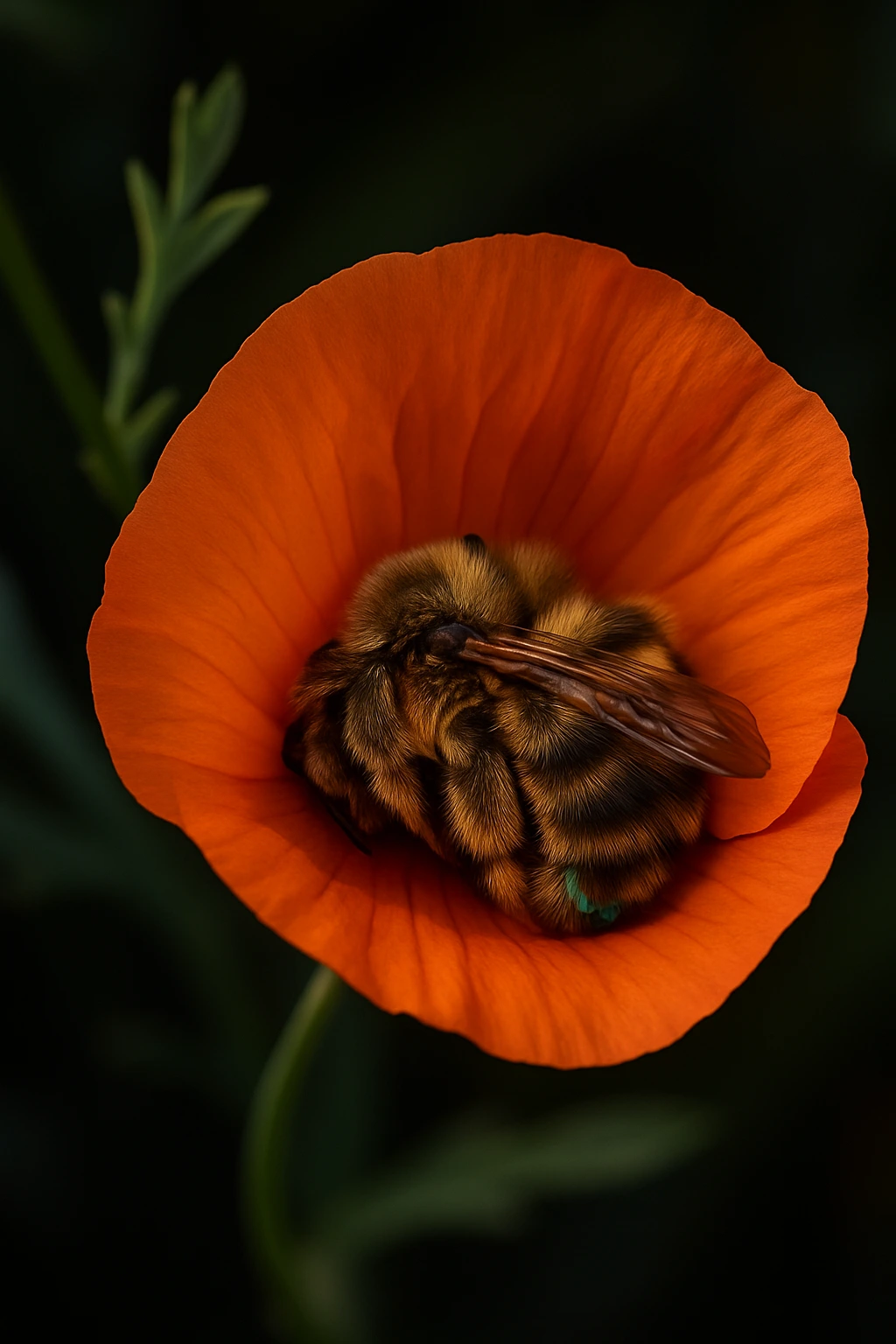Have you ever stopped to wonder if bees actually sleep? We often picture them buzzing tirelessly from flower to flower, working without pause, but the truth is surprisingly relatable—bees need their rest just like we do. These tiny creatures live incredibly busy lives, from collecting nectar to pollinating plants and communicating with their hive. And in the middle of all that, they still make time to curl up inside a flower and take a nap.
I remember the first time I spotted a bee nestled in a blossom, completely motionless. For a moment, I thought it was stuck. Then I realized it was simply resting, and that discovery changed the way I looked at bees forever. Their need for sleep makes them feel a little more human, reminding us that even the hardest workers need downtime to stay strong and focused.
In this article, you’ll discover fascinating facts about how and why bees sleep, each one offering a gentle lesson we can bring into our own daily lives.
- Bees Sleep Between 5 and 8 Hours a Day
Just like us, bees need their beauty sleep. They actually snooze for five to eight hours a day. The first time I learned this, I was surprised because I always thought bees worked non-stop. But just like when I come home after a long day and collapse on the couch, bees also know the importance of recharging for tomorrow’s tasks. - They Often Sleep Inside Flowers
Picture this: a tiny bee curling up inside a flower like it’s a soft bed. I once stopped to take a photo of a wildflower in my garden and noticed a little bee nestled inside, completely still. It looked so peaceful that I didn’t want to disturb it. It reminded me of how cozy it feels to fall asleep under a warm blanket. - They Love Sleeping Next to Other Bees
Bees are social even in their sleep. They sometimes hold each other’s legs as they rest. I can’t help but compare it to when kids fall asleep holding hands after a long day of play. It’s such a gentle reminder that connection and comfort matter, even in the tiniest corners of nature. - Rest Keeps Them Energetic for the Next Day
Without proper rest, bees wouldn’t have the energy to do their important jobs. That makes me think about how grumpy and sluggish I get when I don’t sleep enough—coffee can only do so much! Bees don’t have caffeine, so their only option is a good nap to be ready for another busy day. - Bees Spend Their Days Foraging for Food
Every day, bees are out collecting nectar and pollen. I remember watching them in my backyard buzzing from flower to flower with such determination. It made me think about grocery shopping—I might go aisle to aisle, but at least I don’t have to carry all my food back to feed an entire colony! - They’re Also Pollinators That Keep Nature Thriving
While they’re working, bees are pollinating flowers, which means more fruits, vegetables, and blossoms for us. I once noticed my tomato plants exploded with fruit the year I saw more bees around. It was a direct reminder that their quiet, constant work benefits me more than I realize. - Communication Is Key in the Hive
Bees share information with each other, even using special dances to explain where food is. It’s like when a friend recommends a great new restaurant with a lot of enthusiasm—you just know you have to try it. Watching bees “talk” to each other made me appreciate how important teamwork and sharing knowledge really are. - Rest Is Crucial for the Survival of the Colony
Their naps aren’t just a luxury; they’re essential for the hive’s survival. Without enough rest, they wouldn’t have the strength to gather food, protect their queen, or pollinate plants. It reminds me of times when I tried to work through exhaustion—things always went wrong. Bees teach us that slowing down is sometimes the most productive thing you can do.
- Bees Choose the Perfect “Bedtime Spot”
Not every flower makes a good bed. Bees look for blossoms that close slightly or have deep petals to keep them safe and warm. It’s kind of like when I search for the perfect pillow or a cozy corner of the couch—comfort matters when you’re trying to get a good rest. - Sleeping Bees Look Completely Still
When bees are asleep, they don’t move much at all. I once leaned close to a flower and thought a bee had died—it was so still! A few minutes later it wiggled and buzzed away, proving it was just enjoying a nap. That taught me not to jump to conclusions when something looks “too quiet.” - Temperature Affects Their Rest
Cooler nights encourage bees to cluster together to keep warm. It reminds me of camping trips with friends—huddling close in sleeping bags, whispering before drifting off. Nature repeats itself in so many ways, even with creatures as small as bees. - Not All Bees Sleep the Same Way
Worker bees tend to nap in short bursts, while older bees take longer stretches of rest. It’s funny, because I see the same thing in my family: kids take quick power naps, while grandparents enjoy longer, deeper sleeps. Bees prove that “sleep styles” exist across species. - Bee Sleep Affects Memory and Learning
Studies have shown that bees that don’t rest enough struggle with memory and communication. That hit home for me—I once tried to study all night for an exam, only to forget half of what I learned the next day. Turns out bees and humans both need rest to think clearly. - Watching Them Sleep Can Be Soothing
There’s something peaceful about seeing a bee curled up inside a flower. It’s like nature’s bedtime story. I once found myself sitting in the garden longer than I planned, just watching them snooze. It felt like a gentle reminder to slow down and appreciate small, quiet moments.
Bees may be tiny, but their daily rhythms are a powerful reminder that rest, connection, and balance are essential to survival. Watching them pause inside flowers or huddle together in the hive shows us that even the busiest workers can’t keep going without slowing down. In many ways, their routines mirror our own—long days of work, moments of connection with others, and the need to recharge before doing it all again.
Next time you see a bee, take a moment to appreciate not just the honey and pollination they give us, but also the quiet wisdom they carry. They prove that taking time to rest isn’t lazy—it’s the key to having the strength to keep moving forward. Maybe the bees have it right all along: work with purpose, connect deeply, and never forget the importance of a good night’s sleep.

